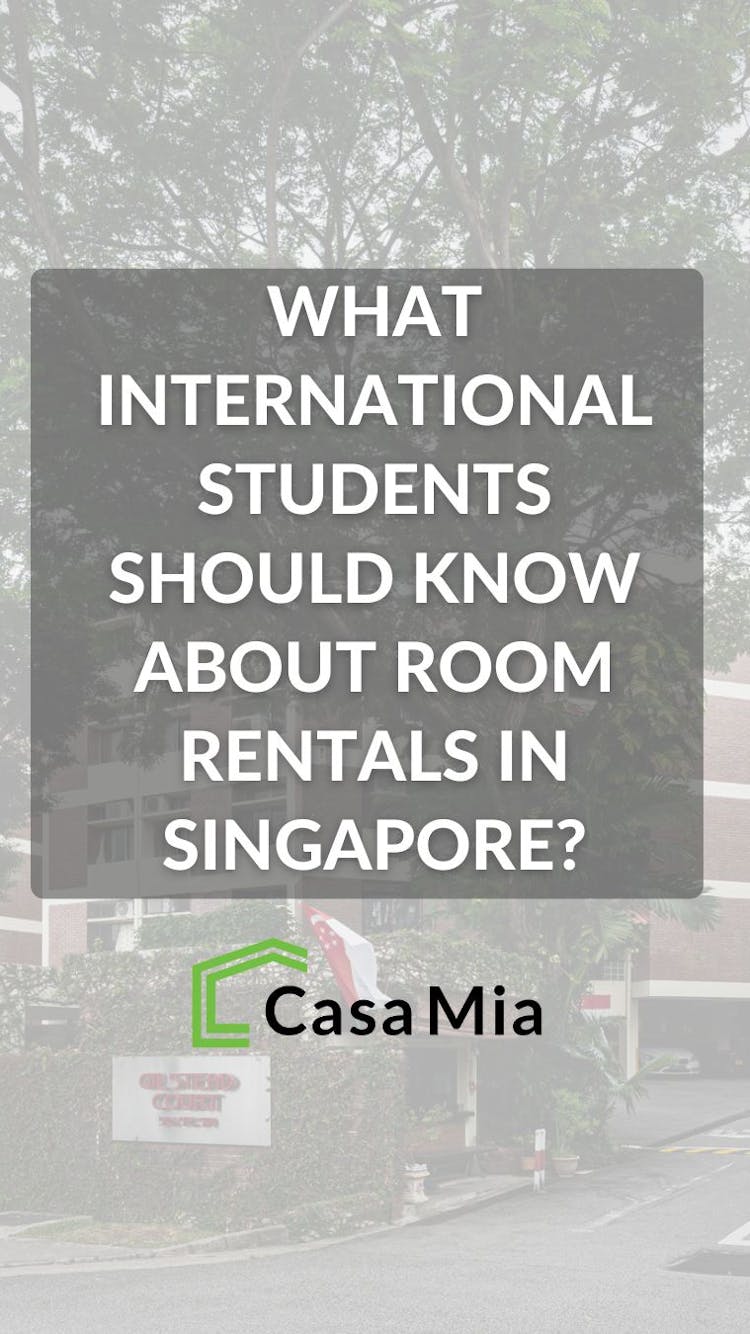What International Students Should Know About Room Rentals in Singapore

07 May 2025
Finding housing as an international student can be challenging, with unfamiliar rental practices and cultural norms. Understanding local markets, budgeting wisely, and exploring all accommodation types are key to success. Good communication, clear expectations, and compatibility with roommates foster a positive shared living experience. With preparation and support, students can confidently settle into a safe and welcoming home abroad.

Finding a place to live while studying abroad can be an overwhelming experience for international students. With different cultures, languages, and rental practices, navigating the housing market can be a challenge. This guide aims to provide essential tips and insights into room rentals that will help international students feel more at home in their new environment.
Understanding the Rental Market
Before diving into the specifics of room rentals, it’s crucial to understand the rental market in the country where you’ll be studying. Each country has its own set of rules, regulations, and cultural norms regarding housing. Familiarizing yourself with these factors can significantly ease your transition into a new environment, allowing you to navigate the complexities of finding suitable accommodation more effectively.
Researching Local Rental Practices
Different cities and regions may have varying rental practices. Some areas may have a high demand for housing, leading to competitive prices and limited availability. Others might offer more affordable options but come with their own set of challenges. Researching local rental websites, forums, and social media groups can provide valuable insights into the current market trends. Furthermore, understanding the seasonal fluctuations in rental prices can also be beneficial; for instance, prices may spike during the beginning of the academic year when many students are seeking housing.
Additionally, connecting with local students or expats can help you gain a better understanding of what to expect. They can share their experiences and recommend reliable rental platforms or neighborhoods that are popular among students. Engaging in conversations with these individuals can also uncover hidden gems in the rental market, such as lesser-known areas that offer great amenities at a fraction of the cost. Moreover, local meetups or online webinars can serve as excellent platforms for networking and gathering firsthand information about the rental landscape.
Types of Accommodations
International students typically have a variety of accommodation options to choose from. These can range from university dormitories to private apartments or shared houses. Each type has its pros and cons, depending on personal preferences and budget. Understanding these options can help students make informed decisions that align with their lifestyle and academic needs.
University dormitories often provide a convenient option for first-year students, as they are usually located on or near campus. However, they may come with strict rules and limited privacy. In contrast, renting a private apartment offers more independence but may require a higher budget and additional responsibilities, such as utility payments and maintenance. Shared houses can be a middle ground, offering both affordability and the opportunity to socialize with peers. These arrangements often foster a sense of community, which can be particularly beneficial for students adjusting to life in a new country. Additionally, some accommodations may include amenities like laundry facilities, internet access, and communal spaces, which can enhance the overall living experience and provide added convenience for busy students juggling their studies and social lives.
Budgeting for Room Rentals
Budgeting is a critical aspect of finding the right accommodation. Understanding the costs involved can help you avoid financial stress during your studies.
Rent and Additional Costs
When renting a room or apartment, the monthly rent is just one part of the equation. Additional costs may include utilities, internet, and maintenance fees. It's essential to clarify with the landlord what is included in the rent and what additional expenses you might incur. Some rentals may include utilities in the monthly payment, while others may require you to set up and pay for these services separately.
Moreover, it’s wise to consider the cost of living in the area. Some neighborhoods may be more affordable than others, but they might also be farther from campus or lack essential amenities. Balancing rent with transportation costs is crucial for effective budgeting.
Deposits and Fees
Most landlords require a security deposit, usually equivalent to one month’s rent. This deposit is held to cover any damages or unpaid rent and is typically refundable at the end of the lease, provided the property is returned in good condition. Be sure to get a receipt for your deposit and understand the terms under which it can be withheld.
Additionally, some landlords may charge application fees or administrative fees. Always ask about these costs upfront to avoid surprises later on.
Finding the Right Rental
Once you have a budget in mind, it’s time to start looking for the right rental. There are several platforms and methods to find accommodations that suit your needs.
Online Platforms and Resources
Today, numerous websites and apps cater specifically to students searching for rentals. Popular platforms often include listings for shared accommodations, apartments, and even sublets. Websites like Craigslist, Facebook Marketplace, and local university housing boards can be invaluable resources.
When using online platforms, it’s essential to be cautious. Always verify the legitimacy of the listings and avoid making any payments before seeing the property in person. Scams are prevalent in the rental market, especially for international students who may be unfamiliar with local practices.
Networking and Word of Mouth
Networking can be one of the most effective ways to find a rental. Connecting with fellow students, professors, or local community members can lead to potential housing opportunities. Many students may know of available rooms or apartments and can provide recommendations based on their experiences.
Additionally, joining student organizations or attending university events can help you meet people who might have leads on housing. Building a network not only aids in finding accommodations but also helps in creating a support system in a new country.
Viewing Properties
Once you’ve identified potential rentals, the next step is to schedule viewings. This is a critical part of the process, as it allows you to assess the property and ask important questions.
What to Look For
During a property viewing, pay attention to several key factors. Check the condition of the property, including appliances, plumbing, and overall cleanliness. Ensure that the room or apartment meets your needs in terms of space, furniture, and amenities.
It’s also a good idea to inspect common areas if you’re considering shared accommodations. Understanding the living situation with roommates is vital for a harmonious living experience. Ask about house rules, cleaning schedules, and any other expectations to ensure compatibility.
Questions to Ask the Landlord
When meeting with the landlord, be prepared with a list of questions. Inquire about the lease terms, including the duration, renewal options, and any penalties for breaking the lease. Understanding the rules regarding guests, noise, and maintenance requests is also crucial.
Additionally, ask about the neighborhood and nearby amenities. Knowing the proximity to public transport, grocery stores, and recreational areas can greatly impact your living experience.
Signing the Lease
After finding the perfect rental, the next step is signing the lease. This legal document outlines the terms and conditions of your rental agreement.
Understanding the Lease Agreement
Before signing, take the time to read through the lease thoroughly. Ensure you understand all the terms, including the rent amount, due dates, and any rules regarding maintenance or repairs. If anything is unclear, don’t hesitate to ask the landlord for clarification.
Pay special attention to the lease duration. Some leases may require a commitment of several months, while others may offer more flexibility. If you’re unsure about your plans, consider negotiating a shorter lease or a month-to-month agreement.
Legal Considerations
It’s essential to know your rights as a tenant. Familiarize yourself with local tenant laws, as they can vary significantly from one country to another. Understanding your rights can help you navigate any disputes that may arise during your tenancy.
If you encounter issues with your landlord or the property, knowing how to address these problems legally is vital. Many universities offer resources or legal advice for students, so don’t hesitate to reach out for assistance if needed.
Living in Shared Accommodations
For many international students, sharing a house or apartment is a common choice. While this can be a cost-effective solution, it also requires good communication and cooperation among roommates.
Establishing House Rules
When moving into a shared space, it’s essential to establish house rules early on. Discuss expectations regarding cleanliness, noise levels, and shared responsibilities. Setting these guidelines can help prevent misunderstandings and foster a positive living environment.
Regular house meetings can also be beneficial for addressing any issues that may arise. Open communication is key to maintaining a harmonious household.
Respecting Privacy and Boundaries
While living with roommates can be fun, it’s essential to respect each other’s privacy and personal space. Everyone has different habits and routines, so being considerate of each other’s needs can go a long way in creating a comfortable living situation.
Additionally, establishing boundaries regarding guests and shared items can help maintain a respectful atmosphere. Discuss these topics openly to ensure everyone feels comfortable in their home.
Preparing for Move-In Day
Once everything is finalized, it’s time to prepare for move-in day. This can be both exciting and stressful, so proper planning is essential.
What to Bring
When moving into a new rental, it’s important to pack wisely. Depending on the type of accommodation, you may need to bring your own furniture, kitchenware, and personal items. Make a checklist of essentials to ensure you don’t forget anything important.
Additionally, consider the climate and local customs when packing. Bringing appropriate clothing and items that reflect your new environment can help you settle in more comfortably.
Settling In
After moving in, take some time to make your new space feel like home. Personalizing your room with decorations, photos, and familiar items can help ease the transition and create a sense of belonging.
Exploring the neighborhood and familiarizing yourself with local amenities can also enhance your experience. Finding nearby grocery stores, cafes, and recreational areas can help you feel more connected to your new community.
Conclusion
Finding the right room rental as an international student can be a challenging yet rewarding experience. By understanding the rental market, budgeting wisely, and communicating effectively with landlords and roommates, students can navigate the housing landscape with confidence.
Embracing the adventure of living abroad involves not only academic pursuits but also creating a comfortable and welcoming home. With the right preparation and mindset, international students can thrive in their new surroundings and make the most of their educational journey.
Find Your Ideal Coliving Space with Casa Mia Coliving
Ready to take the next step in securing your perfect room rental in Singapore? Casa Mia Coliving is here to help you discover the best coliving spaces tailored to your lifestyle. Whether you're an international student seeking convenience and community, or a professional looking for comfort and connectivity, our platform has a variety of options to meet your needs. Explore Spaces today and join the vibrant coliving community that awaits you in Singapore.

I am Eugenio, co-founder at Casa Mia Coliving and a "serial expat" (I lived in Milan, St. Louis, New Delhi, Toronto, Chicago, Seattle and Singapore). When I am not busy with our members and prospective members, you can find me running around the Singapore Botanical Garden, sometime alone, sometime with my two sons.



